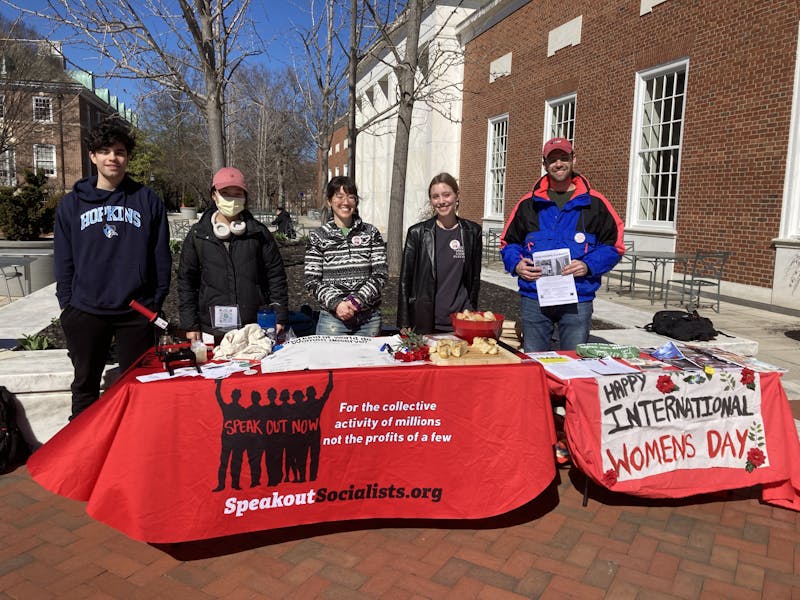
COURTESY OF ALIZA LI
Speak Out Now advocates for a working-class revolution against capitalism.

COURTESY OF ALIZA LI
Speak Out Now advocates for a working-class revolution against capitalism.
Speak Out Now is a socialist group that advocates for active participation in ending capitalism through revolution. According to their website, a socialist system means the “common ownership and sharing of the world’s resources and productive capacity under the democratic control of the world’s peoples,” rather than the exploitation of labor and the ownership of profit by a small number of capitalists.
Unlike other student organizations, Speak Out Now is not formally affiliated with Hopkins. Instead, they are a national organization with chapters in the San Francisco Bay Area, New Jersey and Baltimore. Many of the active members of the Baltimore chapter are Hopkins alumni, which is part of the reason why they center a lot of their chapter-specific activities around the Hopkins campus.
In an interview with The News-Letter, Meg Chow, an alum of Hopkins, shared her experiences organizing with Speak Out Now for several years.
“The end goal, though, is to reach everyone, especially in workplaces,” she said.
As a whole, Speak Out Now primarily targets large workplaces, distributing pamphlets and newsletters on a frequent basis. Chow hopes to see the Baltimore chapter expand to that capacity, but the group also spends its efforts informing and engaging students, who — as young people — have to decide what kind of world they will accept.
“Young people rebel first. We are often the strongest supporters [of] the biggest change,” she said.
Speak Out Now often plans its activities in response to recent events, such as its climate strike on Earth Day in 2022. This event was used to encourage discussion around the campus about the role of capitalism in causing climate change.
Other activities conducted in recent years have included an International Women’s Day event, where they handed out free bread and roses.
“[They were] symbols of the working-class, socialist movements that fought for not only the bare necessities but also a life of fulfillment and beauty,” she said.
By handing these items out and hosting political discussions and collaborative activities, Speak Out Now hoped to inform people about the historical roots of International Women’s Day and open up a larger conversation on socialism and the global changes the group wants to make and believes humanity deserves.
Particularly, Speak Out Now hopes to encourage people to question existing power structures and seek an alternative model.
“We want people to see themselves as actively participating in these activities and promote an environment of open, nuanced conversation,“ she said. “More importantly, these activities are meant to introduce these ideas and lay the foundations for eventual change. Discussions are not the endpoint. We want people to take action and organize.”
Chow went on to emphasize the importance of keeping sight of the goal of their work.
“We are always keeping an eye on the future and the long-term focus, which is to organize the working class to create [the] change they see as necessary and, ultimately, to lead to a revolution to abolish capitalism,” she said.
In an interview with The News-Letter, John Burns, a member of Speak Out Now since 2020, shared how he got involved with the organization after seeing someone flyering outside Brody. Through his involvement with Speak Out Now, Burns feels he better understands how important it is that people take action.
“If we really think this society is fundamentally flawed, we have to be the ones to realize that we have to do something about it. No one else can save us,“ he said.
Burns described that involvement is more than just attending events and ultimately is about building collective power.
“Everything we own is produced by the work of people. Millions of hands of strangers exchanging things to keep this world running. Society will cease to exist if we don’t work. Building collective power is a process to help people to see that we hold the power to change our society,” he said. “We need to organize outside of the system in order to make the changes we want to see.”